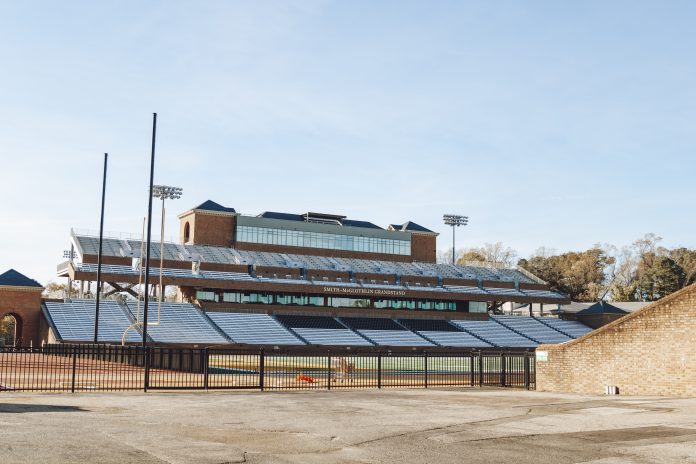Adam Jutt ’25 is planning on majoring in who knows what (maybe public policy and economics). Aside from being an incoming opinions editor, he is a member of Club Tennis and involved with InterVarsity. Feel free to email Adam at adjutt@wm.edu.
The views expressed in the article are the author’s own.
Say that you and your family live in a fictional, rural town called Placeville, along with 350 other families. Every year in Placeville, a town-wide event called The Contest is held in the park. The rules of The Contest are simple: The patriarch of every family (Placeville is not a progressive town) is given a certain number of eggs — each stamped with the family’s crest — and instructed to distribute them however they please between the 24 huge baskets laid out in a roughly circular formation on the grass. Once everyone has allocated their eggs in a manner with which they are satisfied, one egg is randomly chosen by the mayor from each basket. If a selected egg is yours, your family is one of the champions.
Some families receive hundreds of eggs. Others, only a dozen or so. Your family in particular always receives an amount somewhere in the neighborhood of 30. This is notably less than the average, which — for those of you unfamiliar with statistics — means it serves as a sizable disadvantage. It should come as no surprise, then, to learn that despite your family’s long history in Placeville (second longest of any family, as a matter of fact), you have very seldom been among the champions of The Contest. Unfortunately, this lack of victories has translated into a lack of enthusiasm on the part of your family toward the event, especially compared to the verve with which more historically successful families regard it.
You go from basket to basket, tossing an egg or two in each (eggs from Placeville are inexplicably hard to break, which explains why last spring’s First Annual Placeville Egg Toss Competition was such a disaster). However, just before you deposit your last egg, you feel a hand on your back. You turn, and standing before you is one of your daughters, 10 years old this coming Friday.
She is wearing a wide grin and holding a small stick basket inexpertly fashioned together. “Dad, I made this basket for you!” she exclaims; “I figured that if we were the only ones who knew about it, we could put an egg into it and win!” The love and pride you feel for her in the moment brings you close to tears (though when she tells the story she insists it brought you further than close). Choked up, you tell her to go gather the rest of the family.
When the Mayor finishes pulling an egg out of all the other baskets, you call her over (maybe Placeville is more progressive than I gave them credit for!) and inform her that her job is not quite complete. She sees your family gathered ‘round the tiny basket and smiles. She reaches in and pulls out the egg. At that moment your whole family breaks out in dance, song and other celebratory action. It is the most fun you’ve ever had at the Placeville Contest, and you know a tradition has been born. Who knows, maybe in future years other families will put an egg or two into your daughter’s basket, too.…
That seems like more than enough allegory: We as the College of William and Mary need to invent a new sport. We have some strong D1 sports programs here at the College, which is very impressive for our size, but (with occasional notable exception) we simply do not have the resources to compete with the powerhouses. I think most people would agree with me that this lack of dominant teams caps our potential for any remarkable amount of “pep” or “Tribe Pride”; I don’t think Zable Stadium or Kaplan Arena have made many appearances on lists of the rowdiest collegiate sports arenas. Imagine, though, what attendance would look like at an event for a sport we created — bippleball, say. I guarantee that the ticket queues would put Sadler mail lines to shame (yes, that joke would have been more topical three weeks ago). Putting a couple million dollars into developing the sport of bippleball and recruiting the best high school talent would be the best money ever spent by the College.
It might sound crazy, but think about it! If we announced the bequeathment of athletic scholarships for a sport no one yet plays, people would start playing. And in the years before a second college adds bippleball to their sports lineup, we would be guaranteed to rope in the best players in the world. Success begets success, so even when big schools do introduce bippleball programs, they would not be able to compete with us recruiting-wise — I mean we’re the creators of the dang sport for crying out loud! Sports would go from a relatively unexceptional aspect of the College experience to a point of great pride. The University of Alabama has football; Kentucky has basketball; and we would have bippleball. It would be a truly amazing innovation, and while I will be the first to admit I began this article as a joke, I have fully convinced myself of its merit. I see only two reasonable points of contention:
- In the years before a second college adopts bippleball, who would our team play?
This is an excellent question. We would go to other college campuses and collect volunteers to serve as their college’s makeshift team. Hilariously easy wins ensue. (Or maybe — as a more practical but less fun idea — we could start a league in conjunction with a few other colleges.)
2. How does one play bippleball?
If you are the one to figure that out, you just might work your way into the history books.…

